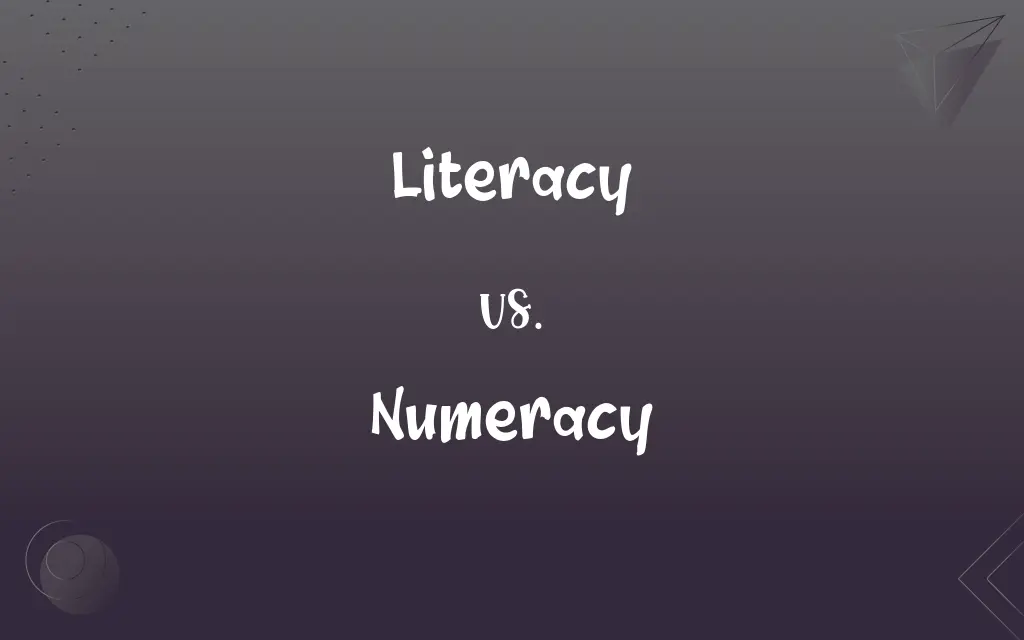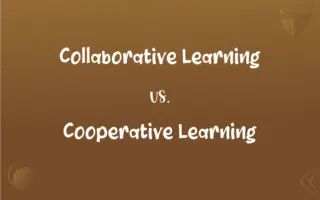Literacy vs. Numeracy: What's the Difference?
Edited by Janet White || By Harlon Moss || Published on December 29, 2023
Literacy is the ability to read and write, while numeracy is the ability to understand and work with numbers.

Key Differences
Literacy involves the ability to comprehend, interpret, and communicate through written words. Numeracy, on the other hand, encompasses the skills to understand and manipulate numerical data.
Literacy is fundamental for reading literature, understanding written instructions, and expressing ideas in writing. Numeracy is crucial for tasks involving calculations, measurements, and analyzing statistical information.
A literate individual can navigate written information, engage in written communication, and analyze texts. Numeracy enables individuals to engage in mathematical reasoning, budgeting, and problem-solving involving numbers.
Literacy skills are developed through education in reading and writing in a specific language. Numeracy skills are developed through education in mathematics, including arithmetic and basic algebra.
In today's world, literacy is essential for most forms of communication and education, while numeracy is indispensable in scientific, technological, and economic fields.
ADVERTISEMENT
Comparison Chart
Core Skill
Reading and writing
Understanding and working with numbers
Applications
Reading literature, writing texts
Calculations, statistical analysis
Educational Focus
Language arts, grammar
Mathematics, arithmetic
Real-world Use
Communicating ideas, interpreting texts
Solving numerical problems, budgeting
Development
Through language education
Through mathematical education
ADVERTISEMENT
Literacy and Numeracy Definitions
Literacy
Capability to interpret and analyze written texts.
Literacy helps in critically evaluating articles.
Numeracy
Proficiency in basic mathematics and calculations.
Her numeracy was essential for her engineering career.
Literacy
The skill of expressing ideas in writing effectively.
His literacy was evident in his eloquent letters.
Numeracy
Capability to interpret and analyze numerical data.
Numeracy helps in making sense of statistics.
Literacy
Proficiency in understanding written content.
Her literacy enabled her to excel in her studies.
Numeracy
Skill in using numbers in practical situations.
His numeracy was useful in everyday budgeting.
Literacy
Understanding the nuances of written language.
High literacy is crucial for effective communication.
Numeracy
The ability to understand and work with numbers.
Numeracy skills are vital for financial management.
Literacy
The condition or quality of being literate, especially the ability to read and write. See Usage Note at literate.
Numeracy
Understanding mathematical concepts and their applications.
Numeracy is key in scientific research.
Literacy
The condition or quality of being knowledgeable in a particular subject or field
Cultural literacy.
Biblical literacy.
Numeracy
To enumerate; count.
Literacy
The ability to read and write.
Numeracy
Able to think and express oneself effectively in quantitative terms.
Literacy
The ability to understand and evaluate something.
Computer literacy; media literacy
Numeracy
The quality of being numerate; numerical skill.
Literacy
State of being literate.
Numeracy
Skill with numbers and mathematics; - the skill with numbers analogous to literacy, the skill of reading.
Literacy
The ability to read and write
Numeracy
Skill with numbers and mathematics
FAQs
What is numeracy?
Numeracy is the ability to understand and use numbers in daily life.
Why is literacy important?
Literacy is crucial for communication, education, and accessing information.
How are literacy and numeracy skills developed?
Both are developed through education and practice, literacy in language arts and numeracy in mathematics.
What is literacy?
Literacy is the ability to read, write, and understand written language.
Is digital literacy part of literacy?
Yes, digital literacy is an extension of literacy in the digital world.
Is numeracy only about basic arithmetic?
Numeracy includes arithmetic but also extends to more complex mathematical concepts.
How does numeracy impact daily life?
Numeracy affects budgeting, shopping, cooking, and understanding time.
Can numeracy skills predict financial success?
Strong numeracy skills often contribute to better financial management and success.
Why is numeracy important?
Numeracy is essential for handling money, measurements, and problem-solving.
Can you be literate but not numerate?
Yes, it's possible to be literate without being strong in numeracy, and vice versa.
How does literacy impact social interaction?
Literacy enhances social interaction through better communication skills.
What are the barriers to achieving literacy?
Barriers include lack of education, resources, and learning disabilities.
What are common challenges in learning numeracy?
Challenges include math anxiety, teaching methods, and practical application.
Are literacy and numeracy only school subjects?
While taught in school, they are essential life skills used daily.
How do literacy skills affect employment?
Literacy skills are critical for most jobs, especially for reading and writing tasks.
Can literacy improve personal growth?
Yes, literacy fosters personal growth through reading and learning.
How does technology influence literacy?
Technology provides new platforms for reading and writing, influencing literacy.
Does technology help in developing numeracy?
Yes, technology offers tools and resources for enhancing numeracy skills.
How do literacy and numeracy complement each other?
Literacy and numeracy together enhance overall understanding and problem-solving abilities.
Are calculators a substitute for numeracy?
Calculators aid in computation but don't replace the understanding of numeracy.
About Author
Written by
Harlon MossHarlon is a seasoned quality moderator and accomplished content writer for Difference Wiki. An alumnus of the prestigious University of California, he earned his degree in Computer Science. Leveraging his academic background, Harlon brings a meticulous and informed perspective to his work, ensuring content accuracy and excellence.
Edited by
Janet WhiteJanet White has been an esteemed writer and blogger for Difference Wiki. Holding a Master's degree in Science and Medical Journalism from the prestigious Boston University, she has consistently demonstrated her expertise and passion for her field. When she's not immersed in her work, Janet relishes her time exercising, delving into a good book, and cherishing moments with friends and family.






































































